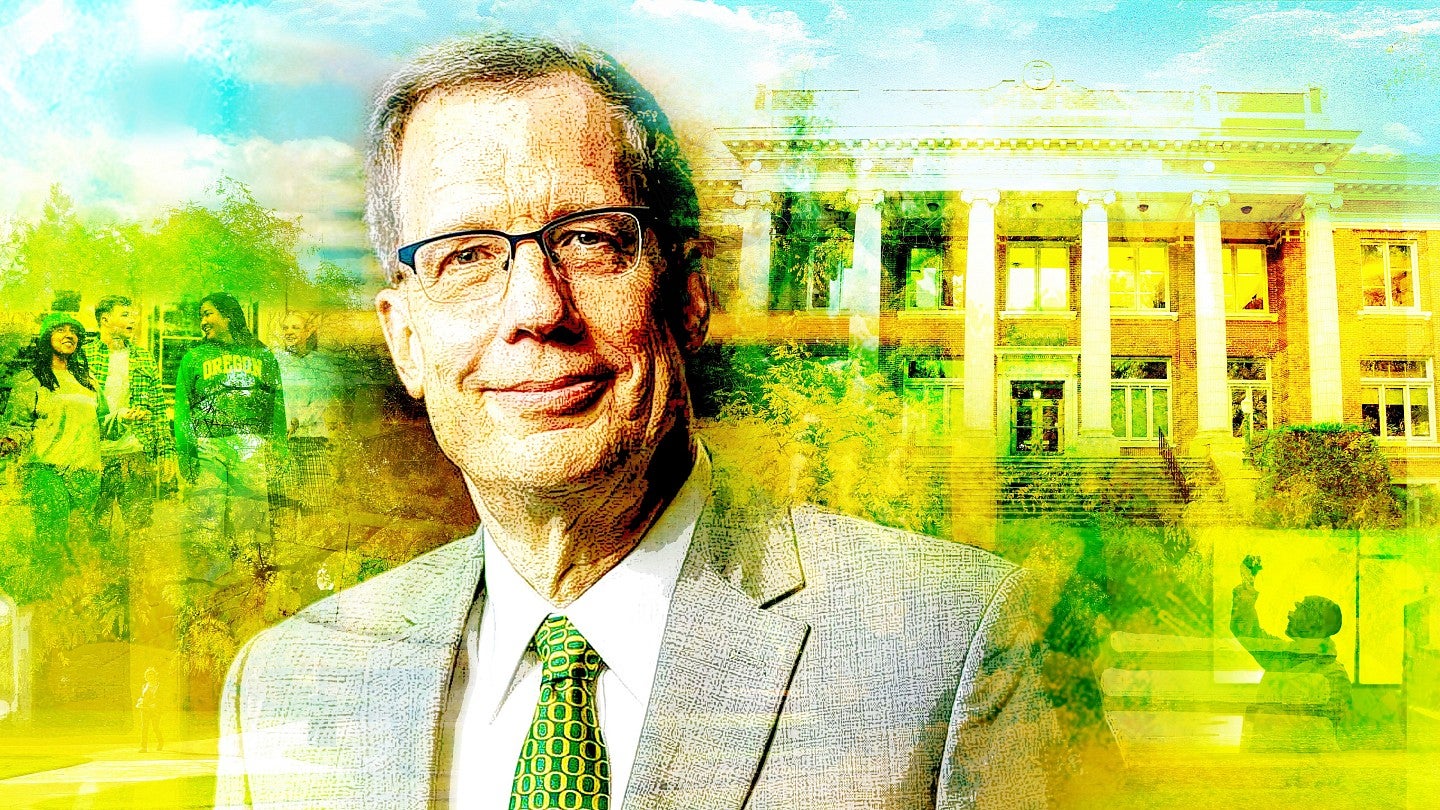
Toward a Thriving University
Karl Scholz, the nineteenth president of the University of Oregon, brings a passion for public higher education, a focus on students, and a framework for imagining our next chapter
By Matt Cooper • Photo illustration by David Gill
Photos by University Communications • December 7, 2023
11 min read
As student body president at the University of Oregon, senior Chloé Webster appreciates that Karl Scholz, the university’s new president, favors casual candor for their talks, absent titles and formality. When they meet, she says, she’s just Chloé and he’s just Karl.
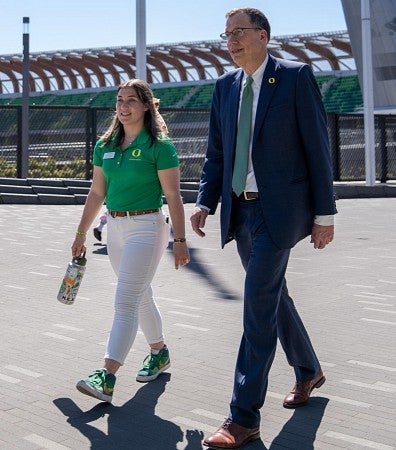
Webster has seen it repeatedly, in Scholz’s interactions with people in general and students in particular: no pomp, no circumstance, just a down-to-earth earnestness and interest in whomever he meets.
Accompanying him for a campus tour, Webster watched as a curious Scholz peppered a facilities crew with questions while in the Lillis Business Complex. Walking together on Thirteenth Avenue during October’s Street Faire, Scholz quizzed Webster and other students about their affection for boba tea, the Taiwanese drink served with starch tapioca balls. Similarly, Webster says she was surprised not just that Scholz attended a recent student government meet-and-greet at which he wasn’t expected, but that he engaged with and remembers student leaders he meets.
Students have pressing concerns, Webster says, and not all her monthly meetings with Scholz will be “sunshine and smiles and walking through the street fair.” But she’s seen enough to believe the new president has students top of mind.
Says Webster: “Because I’ve seen the way in which he’s interacted with students, trying to understand their experience, I feel better about how he makes decisions every day.”
A passion for higher education
When Scholz met earlier this year with the committee searching for the university’s next president, he brought an energy that was palpable, if not contagious.
At six foot five, Scholz commands attention when he enters a room. The effect is only intensified when he talks about something that excites him—his voice grows louder, his arms and hands become animated, radiating enthusiasm.
“He came in with incredible excitement and just captivated the room,” says committee chair Connie Seeley, BS ’92 (political science). “He clearly had done his homework, but in demonstrating that, he showed us the depth of his experience and ability to meet both our challenges and aspirations.”
“He didn’t hold himself back at all; he really gave us a great picture of ‘Karl Scholz,’” adds vice chair Renée Evans Jackman, BA ’97 (sociology). “He was authentic; he was truthful. The committee was wanting more, and he wasn’t apprehensive to tell us what we needed and wanted to hear. We all thought, ‘We have our next president!’”
“I honestly don’t know if I have met someone so excited about public higher education.”
— Connie Seeley, UO Board of Trustees
During his interview, Scholz, then provost for the University of Wisconsin-Madison, celebrated the knowledge that public universities create. He challenged the committee and discussed his own vulnerabilities. He spoke compellingly about diversity and equity, acknowledging “the privilege and responsibility” that comes with being a White man. And he described the transformational impact a public university can have on students and the happiness he feels in helping them succeed. “If he asked me for money,” one person said afterward, “I’d give it to him.”
“You kind of didn’t want it to end,” Seeley says. “I honestly don’t know if I have met someone so excited about public higher education.”
Three priorities: Identifying what matters most
As one of his first orders of business, Karl Scholz, the nineteenth president of the University of Oregon, has defined a core set of priorities that he believes will inform the university’s next chapter.
An effort called UO Onward provides the opportunity for the university community and stakeholders across the state, region, and nation to weigh in. Hundreds of faculty, students, staff, alumni, and others have provided feedback. “If we can collectively agree on things that really matter,” Scholz says, “it will guide our efforts in important ways for the next several years.”
UO Onward proposes three broad priorities, each with specific goals. These include student learning and achieving, elevating Oregon’s distinct academic strengths, and building a culture of belonging.
Student Learning and Achieving. Scholz’s focus on graduation rates and career services is partly practical; given modest state funding, the UO relies on tuition and must show that for this expense, students will be guided efficiently through college and graduation and into a career.
The UO’s four-year graduation rate is 59.3 percent, roughly the rate held by Wisconsin in 2013, when Scholz began a six-year stint as dean of the College of Letters & Science. As dean and later provost, Scholz was involved in improving graduation rates across demographics. Wisconsin’s rate today—driven by the college, which, at twenty-three thousand students, is itself bigger than the UO—is 75.1 percent.
As strategies for improving graduation rates, Scholz says steps could include shoring up emergency financial assistance, ensuring mental health services are reaching students in need, bolstering advising and messaging to underscore the importance of timely graduation, and doing the hard work of curriculum scheduling—and rescheduling—so students can take the classes they need, when they need them.
He is equally committed to strengthening the infrastructure that helps students into careers. At Wisconsin, Scholz led an effort to overhaul career services in his college, including courses, advising, internships, and alumni engagement. The result is SuccessWorks, an innovative program which drives undergraduate engagement in career readiness and skill building and connects students to employers and alumni for job interviews. Since launching in 2017, the program has seen a vast increase in student participation and the number of alumni mentors has grown sixfold, to 440 in the 2022–23 academic year, according to Nathan Barker, SuccessWorks director of marketing and communications. Universities across the country and around the world have visited Madison to study the program.
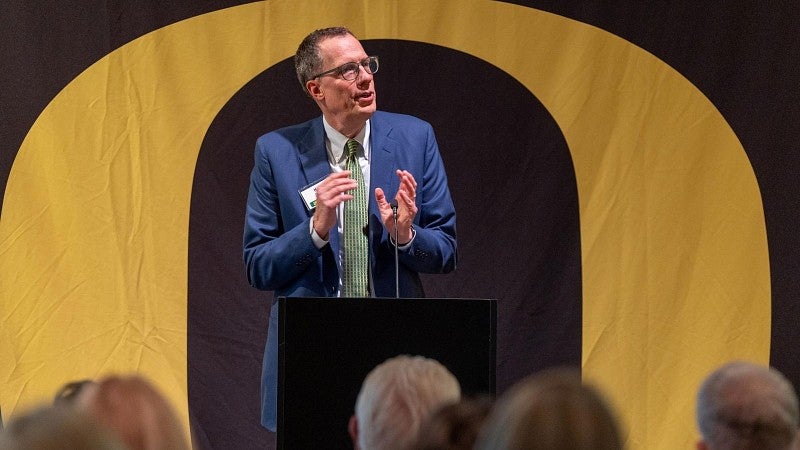
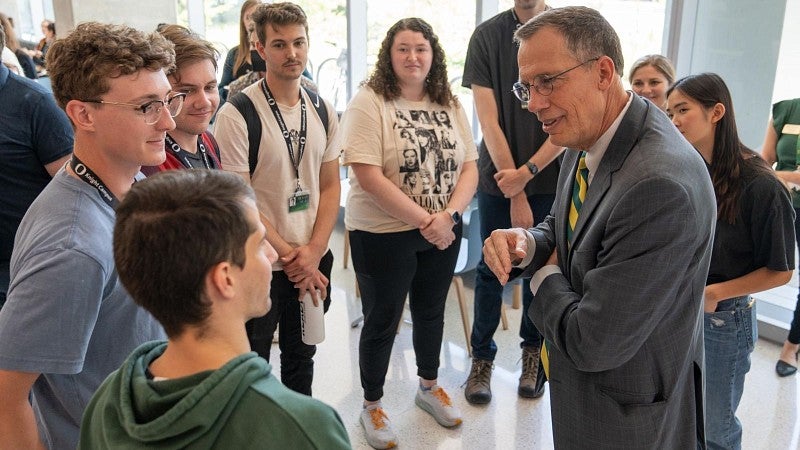
Elevating Oregon’s Academic Strengths. Raising visibility for scholarship and service, particularly in areas of excellence that are distinct to the university, is second of the three priorities. Says Scholz: “We should be proud of the exceptional education we are delivering to our students, our service to the citizens of Oregon, our work in advancing human understanding, and new knowledge we’re creating through research that competes with the finest institutions in the world.”
The UO is an R1 research university—a designation that fewer than 150 universities achieve—and is one of only two in the Pacific Northwest among the seventy-one institutions that comprise the Association of American Universities, the organization that represents North America’s leading research universities. The UO also has a long history of investment in innovation and public partnership, seen most recently in the Phil and Penny Knight Campus for Accelerating Scientific Impact and the Ballmer Institute for Children’s Behavioral Health. Among the university’s academic strengths: leading environment and architecture programs; rich cultural, arts, and performance assets; distinguished professional schools in law, business, and education; and world-renowned leadership in athletics and the science of human performance.
From Belonging to Flourishing. An appreciation for diversity and belonging developed in Scholz as a youth. He was transferred by his parents from his home district to schools that were more socioeconomically and ethnically diverse; his high school, he noted, was the only one in the area with Black students and those of low income. “It was important to my parents that I have a more diverse experience,” Scholz says. “That left a big mark.”
As an economist at Wisconsin, Scholz examined financial barriers to higher education and factors affecting family wealth accumulation. He also directed the university’s Institute for Research on Poverty, which studies economic inequality. As provost, he oversaw an enrollment management unit that raised the percentage of the student body from underrepresented groups by more than 50 percent—to 16.6 percent—in three years. He also led successful efforts that improved the quality and diversity of departmental faculty of UW-Madison.
Scholz believes public universities can help level the playing field in society by ensuring that their students—who typically come from a variety of demographic backgrounds—receive the same world-class education and career opportunities offered in private institutions.
But for all students at the UO to flourish—for all people at the UO to flourish—Scholz says the university must establish a true sense of belonging. He recently held a forum on the topic of belonging during which he invited and answered questions from an audience of three hundred university employees. “If there’s a greater sense of belonging,” Scholz says, “it will be easier to reach real understanding.”
Providing opportunities to make a difference
Scholz was a devoted fundraiser at Wisconsin, having evolved in his thinking about that critical-but-sometimes-uncomfortable duty of academic leaders: inspiring people to donate.
He still finds it a bit awkward to reach out, hat in hand. People didn’t talk much about money in his hometown, Lincoln, Nebraska. As a boy, Scholz once joined his father on a visit with a rancher; in an effort at small talk Scholz asked, “how many cows do you have?” His father later admonished him—“he said, ‘You don’t ask that,’” Scholz says. “I might as well have asked, ‘What’s your net worth?’”
Over time, though, he has come to see fundraising not as an ask from him but as an opportunity for the donor to support the institution they love and to make a difference. “You can bring people joy,” Scholz says, “by providing the opportunity to help.”
Mike Knetter, chief executive officer of the Wisconsin foundation and a close friend, says Scholz was a successful fundraiser because he can spot the right projects to support and articulate why they matter—not to the institution, but to people. “He’s authentic,” Knetter says. “People can sense they’re dealing with a person with really high integrity.”
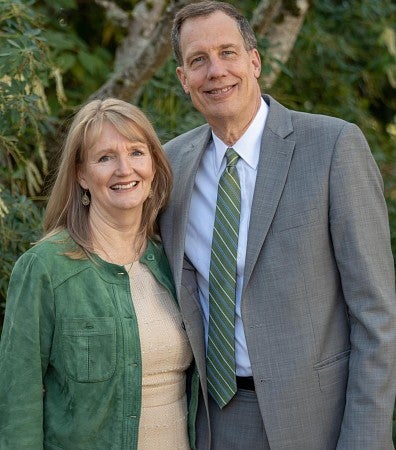
Toward a thriving university
The passion for education that defines Scholz as a university president was instilled in him as a boy, says Melissa Scholz, his wife, an accomplished nonprofit attorney.
Scholz’s parents—John, a chemistry professor, and Joyce, a stay-at-home mother—raised him to be curious, to love learning. Over the years, that love of learning has become a relentless drive for knowledge and a deep commitment to education.
Scholz’s three daughters, in fact, were beneficiaries of that commitment. When they were kids, Scholz, skeptical of math instruction at the primary and middle school levels, worked with them on math at night, doling out peanut M&Ms for correct answers. “I remember being thirteen and hating it,” one daughter says. “I was having to sit during summers and do math. As I’ve grown up, I’ve realized it speaks to how he cares about things quite deeply.”
UO administrators say the care Scholz takes with the issues is rooted in a commitment to hearing all sides before he acts.
Certainly, Scholz is capable of taking bold and calculated risks, as evidenced by his announcement in August that the UO will join the Big Ten Conference.
Moreover, Bob Guldberg, DeArmond Executive Director of the Knight Campus, the UO’s research-to-application enterprise, has seen the president’s willingness to take risks in the context of innovation and entrepreneurship. “We teach our students that all the time—taking risks and not being afraid to fail is part of the learning process toward success,” Guldberg says. “[Scholz’s approach] has me really optimistic for the future.”
“[Scholz’s approach] has me really optimistic for the future.”
— Bob Guldberg, Knight Campus
He is also willing to consider advice and change course. Jamie Moffitt, chief financial officer, says she has seen the president routinely “go into a meeting thinking we’re going to go in one direction and then listen to the expertise of staff and advisors and consider a different decision.”
Consistent throughout, according to those who know him, is his trust in the opinions and abilities of those around him.
Rebekah Paré, for example, was working at Wisconsin in an area unrelated to career services when Scholz tapped her to help build SuccessWorks and serve as executive director. “That’s how he leads,” says Paré, now a higher education consultant. “He’s going to create space for people to rise. He realizes he can’t do it alone. It’s a lot about people empowerment.”
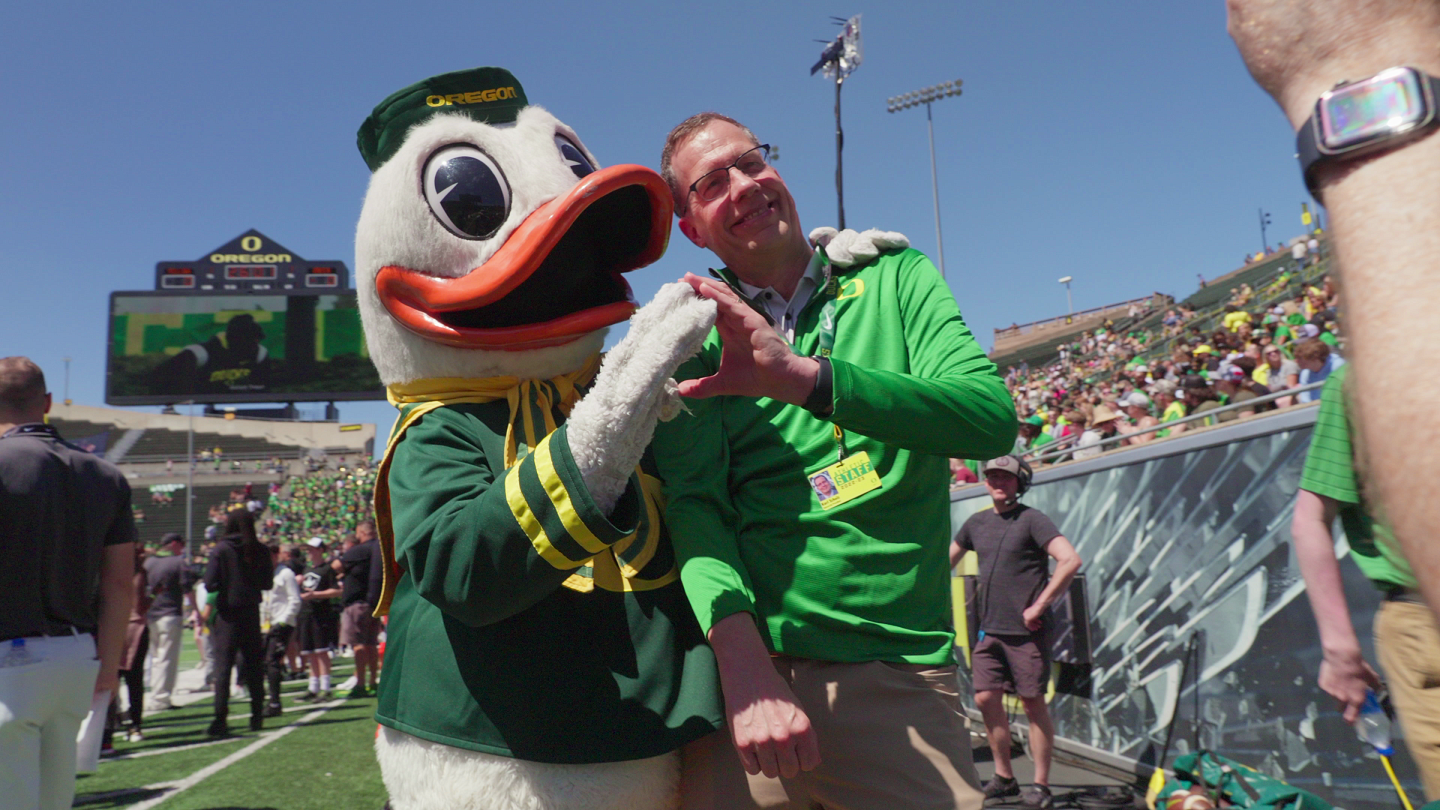
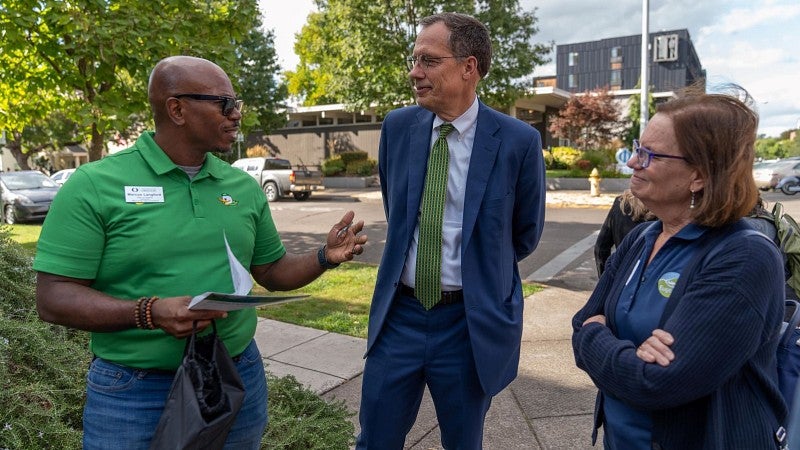
Steve Holwerda, chair of the trustees, says the UO Onward approach exemplifies Scholz’s leadership style, which is to gather as much input from as many voices as possible before he acts.
“He wants to hear from everybody—it’s the best way to build consensus, everyone gets a chance to be heard,” Holwerda says. “Karl recognizes we can’t reach our goals unless everyone is on board with the university’s direction.”
Throughout her husband’s thirty-plus years in academia, Melissa Scholz says, Karl Scholz has been well served by giving everyone a voice and empowering those around him. It speaks not just to the analyst in him who solves problems by collecting reams of data, she adds, but to the humanist who believes deeply in the dignity of all people.
“He’s working with people who share his interest in a thriving university,” Melissa Scholz says. “He knows he can’t move the aircraft carrier by himself. He has a strong baseline respect for human beings who are here, working, dedicated to the university. He sees himself as a leader to unlock that potential.”
Matt Cooper is managing editor for Oregon Quarterly.

